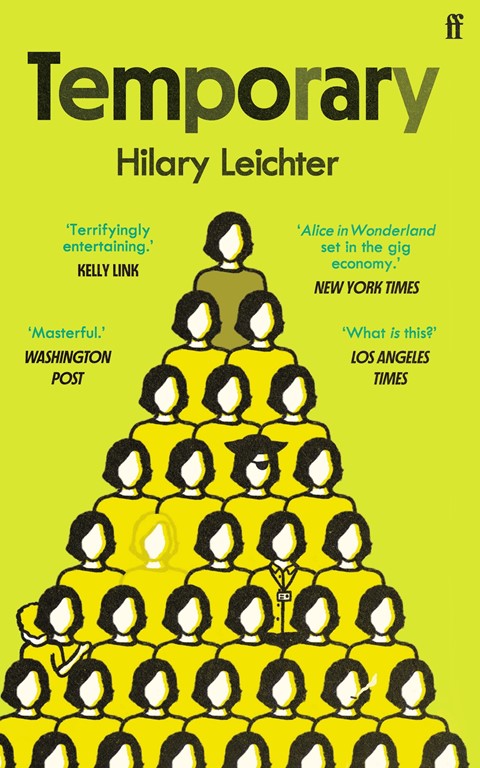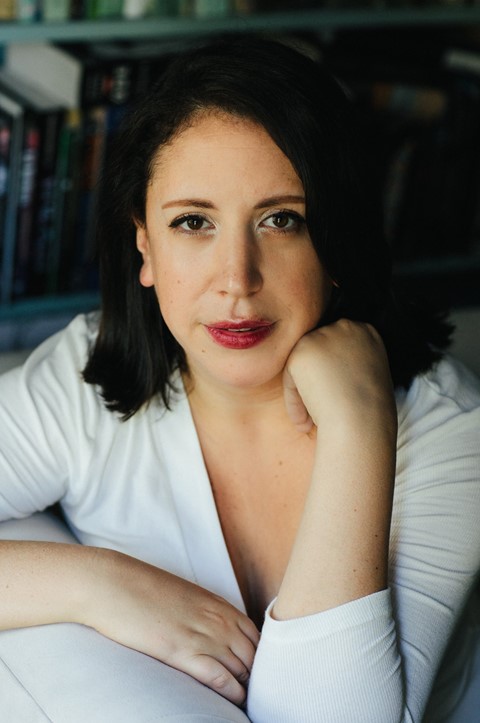In her psychedelic book, Temporary, New Yorker writer Hilary Leichter explores the problems with the gig economy
Hilary Leichter’s new book, Temporary, is a psychedelic trip through 21st-century work culture. The protagonist is an unnamed young woman who, on a quest for belonging and stability, ends up taking increasingly surreal job placements, including pirate-ship swabber, murderer, and ghost. Although disposable to her employers, she approaches each role with an upbeat, can-do attitude, in the hope that she will one day find security. In the words of the New York Times, Temporary is like “Alice in Wonderland set in the gig economy”.
New Jersey-born Leichter is already an established short story writer, having been published in the New Yorker, n+1 and The Cut. Temporary is her debut novel, and offers a daring new twist on the classic social allegory narrative. Having been released in the US on March 3, 2020, it also came at exactly the right time: “The pandemic has magnified things that were already problems, like the way that we rely on women to do everything, and the way that we valorise key workers but don’t pay them properly,” Leichter tells me over Zoom. “None of that is new, but hopefully it’s being taken a little bit more seriously now.” With Temporary set for its long-awaited release in the UK this week, we spoke more about the novel’s themes, and the problems it presents about work in the 21st century.
Dominique Sisley: Temporary is your first novel, and it feels like a very daring, surreal debut. When did you decide this was going to be a book?
Hilary Leichter: I originally wrote it as a short story from my graduate thesis. But then, a few years later, I was looking through my old short stories to see if I could get some book inspiration. I read it and thought it was interesting that although I had written it four or five years ago, I was still responding emotionally to the problems in that story. I was almost 30, but I was still living the same haphazard existence as my early 20s, and that was interesting to me. Then I started writing it as a novel and it was just so much fun; I felt no pressure, I just wrote whatever came to mind. I just allowed myself to get back to that place of play, which is so hard to find when you’re feeling the pressure of the industry or the high expectations that you’ve set for yourself.

DS: It feels fun to read too, but also there’s also a lot of anger in it right?
HL: I’ve tried to think about what kind of headspace I was in when I was writing it. It was 2016 and Donald Trump was on the verge of being elected, the country was falling apart, and I was tired and sad. All of that is true. But also this book is very Jewish, without once mentioning Judaism. Jewish humour tends to come from deep wells of pain and rage [Laughs.]. If you can’t sense the anger underneath it, then it’s probably not Jewish humour. In a way, it’s impossible for me to write something that I find funny without it also being deeply sad.
DS: How much of it is based on your own life? Have you had a lot of temp jobs?
HL: Most of the time I was just saying yes to whatever crappy job came my way, and not even thinking twice about it. That was my motive for existing. It’s only recently that I’ve started allowing myself to say no to things.
DS: What is your relationship like to work?
HL: I actually love working. And when I’ve had jobs that are meaningless or underpaid, I still really loved doing a lot of them, because of the feeling of completion. I think it’s because art resists that; it’s never complete, so it’s really satisfying to go to an office and have a project and finish it. But my problem with work – and it’s a problem with our generation – is that I’m always anticipating everything falling apart. For most of my adult life, I’ve never felt like I could turn down work, and often I’d be working five or six jobs simultaneously and running myself into the ground. It’s like we’re all traumatised by the need for stability. A big part of being alive right now is just not feeling like you can ever turn down employment.
“Women are always asked to do the impossible. It’s not that men are never asked to do that, but they are more likely to say no” – Hilary Leichter
DS: Is this unstable work culture the main issue you’re criticising in the book?
HL: I think it’s one of them. It’s also a critique of the way that we treat each other, and the way that we treat ourselves. We treat people as disposable – by hiring someone to a temporary position, you’re basically saying I don’t ever have to get to know you, and so the way that I treat you doesn’t matter. If I don’t know who you are, then I’m not hurting anyone, because you’re no one. Of course, it’s a simplification – I’ve certainly had temp jobs where my boss is lovely – but it’s built into the system, so even if you’re a good employer, you’re still engaging in a system that dehumanises people.
DS: The protagonist is a woman, and at one point she takes on a temp job as a mother. In what way does gender play into the novel?
HL: It was important for me to show that women are always asked to do the impossible. It’s not that men are never asked to do that, but they are more likely to say no, whereas women are more likely to say yes. Also, a lot of my women students will resist applying for a job if they don’t 100 per cent meet the criteria for the position, but men will just apply, even if they’re woefully under-qualified. With women, I think that speaks to the desire to actually do good work, and our sense of our own worth. I think this would be a very different book if it was about a man; it would only be about 20 pages. The temp employers would ask him to do something uncomfortable and he would just say no.
DS: There’s a character in the book, Anna, who we take as successful because she wears a lot of cashmere. I feel like a cashmere-heavy wardrobe is the real marker of success for women in their thirties.
HL: Yeah, all my friends who are not writers – the ones who have brilliant careers as doctors and architects – are there now. It felt comical how they all started buying houses and dogs and had cashmere, and I felt like I was doing something wrong. [Laughs.]. I wouldn’t even call it jealousy, it’s more feeling like you missed the memo.
DS: Now you’re a novelist, do you feel closer to that all-cashmere wardrobe?
HL: I can say that, for the first time in my life, I’m only taking on work that relates to my career, which is just writing, reading, and teaching. For me, that is a huge accomplishment. I’ve never had that at any point in my life. So I wouldn’t say that I’m decked in cashmere, but I feel a lot of happiness and gratitude related to my work, which is something new.
Temporary by Hilary Leichter is published by Faber, and available now.
